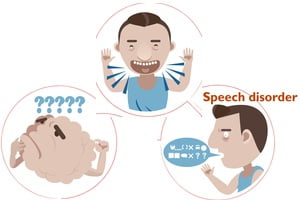What are the Signs and Symptoms of Schizophrenia?
- Updated on: Jul 9, 2024
- 4 min Read
- Published on Apr 18, 2021

Schizophrenia Symptoms
A person with schizophrenia may show a range of problems with thinking (cognition), behavior or emotions. Signs and symptoms may vary in different people based on the severity and can chance with time. But, most common signs are delusions, hallucinations, disorganized speech, an impaired ability to function, confused thinking, and other unusual behavior.
Several types of experiences and behaviors can be part of schizophrenia. They can start suddenly for some people, or develop gradually over time in others. Signs usually first appear in a person’s late teens through early thirties.
People with schizophrenia may show psychotic behaviors, which can be quite troubling for friends and family members associated with the patient. These behaviors are called ‘positive’ symptoms.
Read about: what schizophrenia is
Positive and Negative Symptoms
Symptoms are categorized as positive or negative. This doesn’t mean they are good or bad.
Positive Symptoms
Positive symptoms are those symptoms of schizophrenia that respond well to treatment. Hallucinations and delusions are examples of the positive symptoms. Disordered thoughts and speech are also considered positive symptoms. They’re called positive because they indicate increased activation of certain areas of your brain.
Negative Symptoms
Negative symptoms are those experiences or behaviors that you stop having (or there is a decrease). For example, you may find some people or activities less enjoyable to a person.
Negative symptoms indicate an inability to function normally such as an inability to experience pleasure, a lack of interest for social connections, and not showing any emotions or expressions.
These symptoms don’t respond to drug therapy and are due to decreased activation of certain regions of your brain. Hence, the name – negative symptoms.
What are the Signs and symptoms of schizophrenia?
Various symptoms of schizophrenia are discussed here. However, it’s not yet known exactly why these symptoms appear.
Read about: the causes of schizophrenia
Hallucinations
This is when a person sees, smells, hears, tastes, or feels things that aren’t really there and don’t exist outside their mind. A touch is lost with the reality.
Hallucinations can be any of the senses, but, hearing of voices is the most common type of hallucination in people with schizophrenia. These people may feel invisible fingers or hands touching their bodies while, in reality, there is no one there at all.
Hallucinations seem very real to the person who experience them, even though people nearby them can’t hear any such voices.
Some people find these voices very friendly, but more often they’re rude, abusive or irritating. These voices may represent various activities taking place, repeating the thoughts and behavior of the hearer, give instructions to the person, and so on. Voices may come from different places or from one place.
Delusions
These are false beliefs that do not exist in reality but are held with great conviction by the person. These are often illogical, bizarre, and mistaken beliefs. For example, you may feel as if someone is harming you or harassing you or attacking you. For example, you may feel that:
- certain gestures or comments or expressions are directed at you
- you have developed an exceptional ability
- you are very famous
- another person is in love with you
- a major catastrophe is about to happen
- someone is spying on you or plot against you
- someone is monitoring you
- you are being watched, chased, followed, or poisoned
Some people may believe that people on TV or in books or newspapers are communicating to them alone. They may feel that there are hidden messages in the colors of vehicles passing in front of them.
Delusions generally are fixed beliefs that persist if though there are evidences that the belief is not correct.
Disorganized thinking (speech)
Their communication can be impaired. Their answers to questions may be either partially or completely unrelated. They are unable to organize words in a logical way. They may talk in a jumbled or confused way that’s difficult to understand. They may use meaningless words in conversations that are difficult to understand or can’t be understood at all. Disorganized speech comes from disorganized thinking.
Some people find it difficult to concentrate and will run from one idea to another. They may find reading newspaper or watching TV programmes difficult due to lack of concentration.
Behavioral Symptoms
Behavioral symptoms usually start appearing in adolescence or early adulthood. A person who experiences these symptoms will require a long-term independence. Even basic activities such as dressing, easing, grooming can be a challenge for them. These may include such as:
- disturbed social or work relationships
- behavior becomes more unpredictable and disorganized
- sometimes, the behavior is strange and too shocking
- difficulty with self-care
- flattened affect – a condition in which a person can’t experience normal range of human emotions
- cognitive symptoms – these can include difficulty in thinking and remembering information
- some people experience as if their thoughts are being controlled by someone else or thoughts have been planted in their mind
Physical Symptoms
Sometimes, these symptoms may appear in reaction to voices people hear. Physical symptoms may include:
- catatonia
- they may appear immobilized or in a stupor
- they may make agitated or repetitive movements
Violent Behavior and Suicide Attempts
Some people with schizophrenia become violent. However, according to the National Institute of Mental Health, people with schizophrenia are not usually violent. However, how people behave with them may increase/decrease the chances of a person getting violent. But, suicide is a big risk with people who suffer with schizophrenia. About 10 percent of people with the disease die by suicide.
Psychosis
Doctors describe schizophrenia as a type of psychosis. People may experience episodes of psychosis which may be very difficult to cope with both for the patient and his family members, particularly, the first chronic episode.
Shocking changes may occur in their behavior during these episodes. The person can become upset, anxious, angry, confused, or suspicious of people around them. It can become very difficult to persuade the patient to visit a doctor in such a situation.
A diagnosis of schizophrenia requires that at least one of the key symptoms discussed above persist for six months or longer. Two or more of these symptoms should occur most of the time over a period of one month.
Read about: diagnosis of schizophrenia
If you notice any of the above symptoms in a person, you should immediately see a doctor. It is important to get the treatment earlier. The earlier it starts, the more likely it is to benefit.
Read about: treatment of schizophrenia












